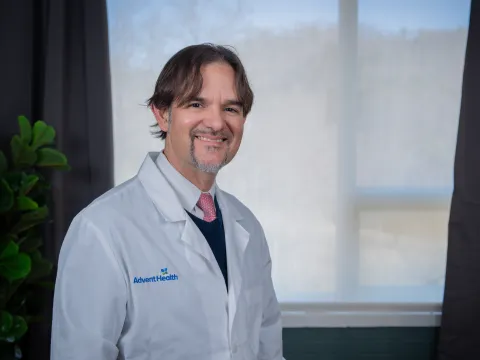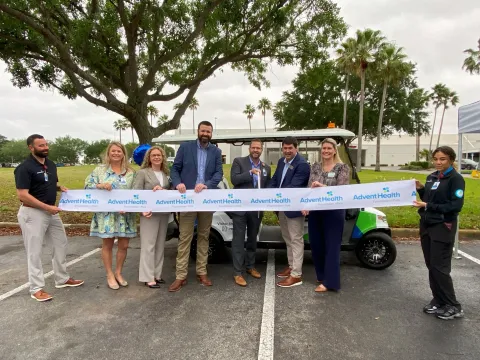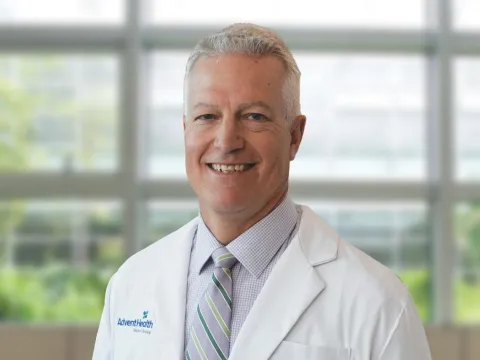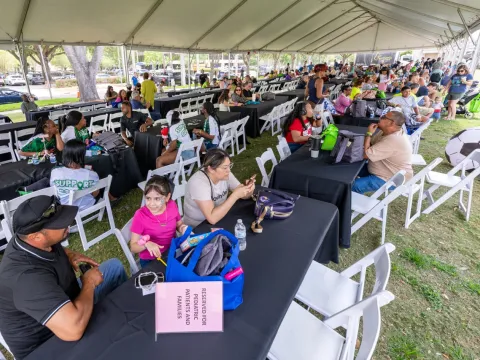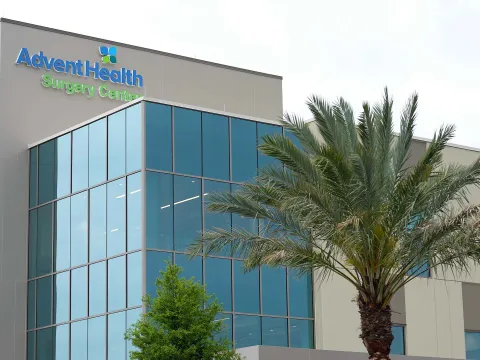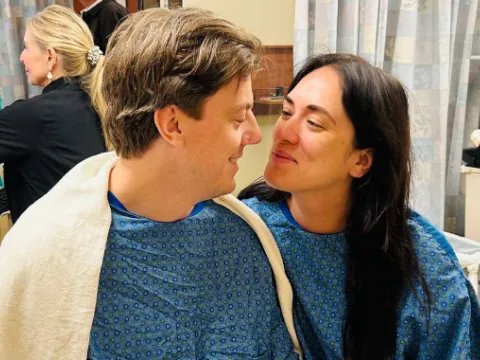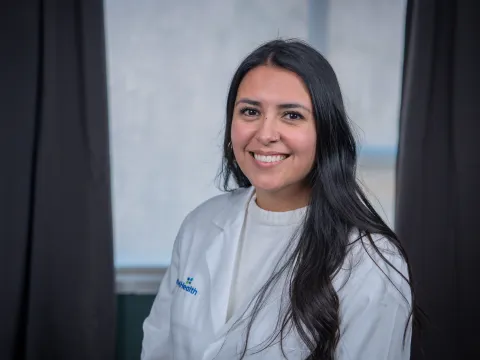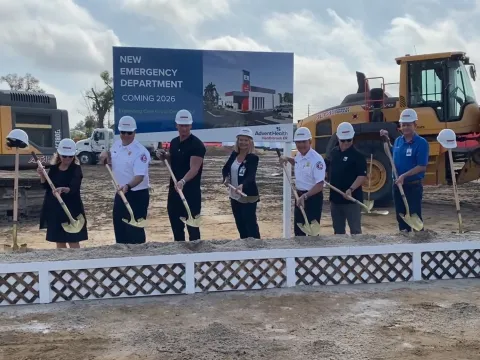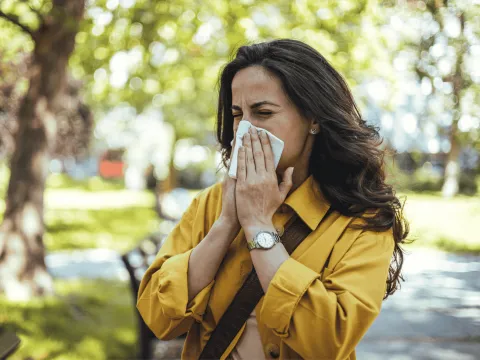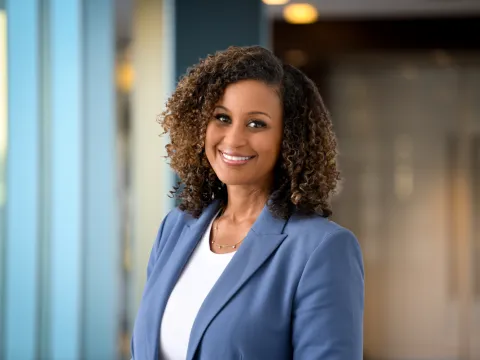- AdventHealth

A stroke is a sudden medical emergency that affects someone every 40 seconds in the United States and is one of our country’s leading causes of disability. According to the CDC, anyone can have a stroke at any age, but certain factors can increase your likelihood of a stroke. These include high blood pressure, high cholesterol, heart disease, diabetes, family history and risky health behaviors such as smoking or drinking too much alcohol. Your lifestyle can also increase your risk of stroke which is why it’s important to maintain a relationship with your primary care physician to take steps to maintain a healthy lifestyle.
Stroke Coordinator Heather Guthrie, RN, coordinates both the stroke response teams at AdventHealth Gordon and AdventHealth Murray but also helps educate the community on what to look for to recognize and respond to a stroke.
“Time is tissue, time is brain,” said Guthrie. “Every minute we lose almost 2 million neurons during a large vessel stroke so you have to get to the emergency room and get treatment to stop the stroke so we can prevent death and disability.”
Guthrie has witnessed patients arrive at the hospital during a stroke, receive rapid treatment and walk out of the hospital and go on to live normal lives. For example, a patient arrived with complete paralysis of their left arm and leg and also had some issues with slurred speech. The patient called 911 within 15 minutes of the symptoms beginning. The AdventHealth Gordon EMS team called a stroke alert ahead of the patient’s arrival. Nurses, radiology staff and the tele-neurology team were on standby at the CT scanner when the patient arrived, and within 30 minutes of arrival, the team had determined the patient was eligible for the “clot-busting” thrombolytic medication. Within 30 minutes of initiating the treatment, the patient was able to move their arm and leg.
The best-case scenario, Guthrie says, is if the symptoms are recognized immediately and our team is able to intervene and help the patient. She says every friend or family member should understand these symptoms to recognize the onset of a stroke.
“Knowing what stroke symptoms look like by using the B.E. F.A.S.T. acronym can save your life or a loved one’s,” said Guthrie.
What is a Stroke?
A stroke happens when blood flow is blocked to part of your brain (ischemic stroke) or a blood vessel suddenly bursts (hemorrhagic stroke). These events can cut off blood and oxygen supply to your brain and damage brain cells. Long-term physical damage can occur if a stroke is left untreated or care is delayed.
How to B.E. F.A.S.T
Remember the signs and symptoms of a stroke by using the acronym B.E. F.A.S.T., which stands for:
- Balance: Does the person have trouble with balance, coordination or dizziness?
- Eyes: Is the person experiencing sudden blurring or loss of vision in one or both eyes?
- Face: When the person smiles, does one side of the face droop?
- Arms: Does the person have arm or leg weakness?
- Speech: Is the person’s speech slurred? Can they repeat a simple sentence?
- Time: If the person has any of these symptoms, call 911 immediately.
Similar to heart attacks, stroke symptoms can vary between men and women. You should specifically look out for these stroke symptoms in women:
- Agitation or sudden behavioral change
- Difficulty breathing
- General weakness
- Hallucination
- Hiccups
- Loss of consciousness
- Nausea or vomiting
- Pain
- Seizures
It is recommended to call 911 right away if you or a loved one are experiencing stroke symptoms.
“Do not drive yourself or your loved one. Call for an ambulance instead,” said Guthrie. “When EMS is activated, they are able to call in a stroke alert to the hospital during the ride, and the ER team is waiting for them to walk through the door to take rapid care of the patient.”
Receiving immediate, life-saving medical care for a stroke increases a patient’s chances of survival and reduces long-term harm, such as difficulty walking, speaking or eating, explained Guthrie.
Expert Stroke Care When You Need It Most
If a person shows any stroke symptoms, call 911 immediately. Fast stroke intervention means that our physicians and ER experts can give your loved ones medicine and treatment that helps restore blood flow to their brain and stops further damage.
Residents in Gordon and surrounding counties can receive world-class neurology and stroke diagnoses closer to home through our telemedicine program. This program allows patients to have access to a network of neurologists specially trained in diagnosing and treating strokes via a real-time video conference when they arrive in the emergency room.
Choose the health content that’s right for you, and get it delivered right in your inbox.
Recent News
Final steel beam marks key step in AdventHealth Daytona Beach expansion
Local leaders, officials, and construction workers gathered today to commemorate a major milestone in the expansion underway at AdventHealth Daytona Beach: placing the final steel beam.
AdventHealth is excited to introduce Eugenio L. Menendez, DO, FACP, to our community of care. He is joining the team at AdventHealth Medical Group Family Medicine at Hendersonville* following the...
AdventHealth Heart of Florida and AdventHealth Polk Foundation leaders are delighted to unveil a new courtesy visitor shuttle meant to enhance accessibility and comfort for patients.
Dr. Jeffrey Keen, a board-certified orthopedic surgeon specializing in adult reconstruction, orthopedic surgery, robotic-assisted surgery, and sports medicine, has returned to AdventHealth Medical...
In recognition of National Donate Life Month, nearly 300 transplant patients and their families enjoyed AdventHealth’s 2025 transplant reunion.
By managing ASCs as distinct entities with tailored operations, financial structures, and physician partnerships, the East Florida Division is fostering collaboration, efficiency, and growth.
According to the National Kidney Foundation, more than 101,000 people are currently on the organ transplant list in need of a new kidney. However, only about 17,000 transplants happen each year —...
Leaders and volunteers from AdventHealth, United Way of Central Florida, Hands for the Homeless and the community worked together to distribute more than 9400 pounds of food to people in need.
AdventHealth is excited to welcome Shalom Littrell, LCSWA, to its team at AdventHealth Medical Group Psychiatry at Medical Office Building*. Littrell is a Licensed Clinical Social Work Associate and...
The AdventHealth Heathbrook ER will have 12 exam rooms, including a resuscitation room, a bariatric room, an isolation room, obstetrics-friendly room and pediatric-friendly rooms.
Ming Wu, MD -- a family medicine doctor with AdventHealth Littleton -- talks about the ways to lessen the impact of seasonal allergies this spring.
The East Florida Division is forming strong partnerships with independent physicians, driving mutual success and improving hospital throughput.


